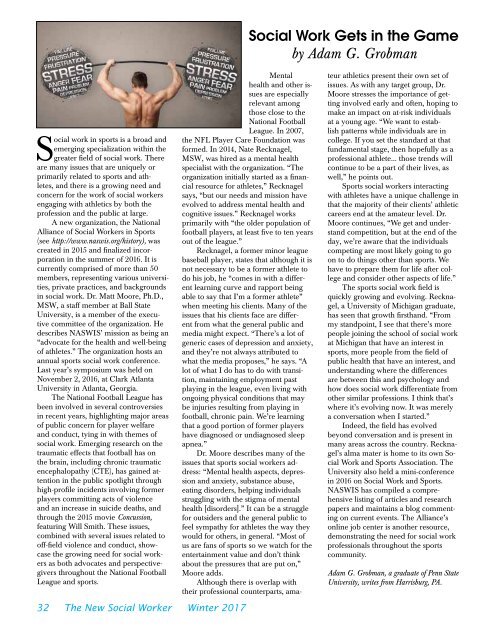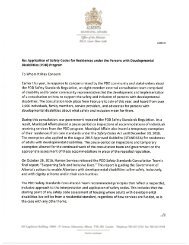In This Issue
click
click
You also want an ePaper? Increase the reach of your titles
YUMPU automatically turns print PDFs into web optimized ePapers that Google loves.
Social Work Gets in the Game<br />
by Adam G. Grobman<br />
Social work in sports is a broad and<br />
emerging specialization within the<br />
greater field of social work. There<br />
are many issues that are uniquely or<br />
primarily related to sports and athletes,<br />
and there is a growing need and<br />
concern for the work of social workers<br />
engaging with athletics by both the<br />
profession and the public at large.<br />
A new organization, the National<br />
Alliance of Social Workers in Sports<br />
(see http://www.naswis.org/history), was<br />
created in 2015 and finalized incorporation<br />
in the summer of 2016. It is<br />
currently comprised of more than 50<br />
members, representing various universities,<br />
private practices, and backgrounds<br />
in social work. Dr. Matt Moore, Ph.D.,<br />
MSW, a staff member at Ball State<br />
University, is a member of the executive<br />
committee of the organization. He<br />
describes NASWIS’ mission as being an<br />
“advocate for the health and well-being<br />
of athletes.” The organization hosts an<br />
annual sports social work conference.<br />
Last year’s symposium was held on<br />
November 2, 2016, at Clark Atlanta<br />
University in Atlanta, Georgia.<br />
The National Football League has<br />
been involved in several controversies<br />
in recent years, highlighting major areas<br />
of public concern for player welfare<br />
and conduct, tying in with themes of<br />
social work. Emerging research on the<br />
traumatic effects that football has on<br />
the brain, including chronic traumatic<br />
encephalopathy (CTE), has gained attention<br />
in the public spotlight through<br />
high-profile incidents involving former<br />
players committing acts of violence<br />
and an increase in suicide deaths, and<br />
through the 2015 movie Concussion,<br />
featuring Will Smith. These issues,<br />
combined with several issues related to<br />
off-field violence and conduct, showcase<br />
the growing need for social workers<br />
as both advocates and perspectivegivers<br />
throughout the National Football<br />
League and sports.<br />
32 The New Social Worker Winter 2017<br />
Mental<br />
health and other issues<br />
are especially<br />
relevant among<br />
those close to the<br />
National Football<br />
League. <strong>In</strong> 2007,<br />
the NFL Player Care Foundation was<br />
formed. <strong>In</strong> 2014, Nate Recknagel,<br />
MSW, was hired as a mental health<br />
specialist with the organization. “The<br />
organization initially started as a financial<br />
resource for athletes,” Recknagel<br />
says, “but our needs and mission have<br />
evolved to address mental health and<br />
cognitive issues.” Recknagel works<br />
primarily with “the older population of<br />
football players, at least five to ten years<br />
out of the league.”<br />
Recknagel, a former minor league<br />
baseball player, states that although it is<br />
not necessary to be a former athlete to<br />
do his job, he “comes in with a different<br />
learning curve and rapport being<br />
able to say that I’m a former athlete”<br />
when meeting his clients. Many of the<br />
issues that his clients face are different<br />
from what the general public and<br />
media might expect. “There’s a lot of<br />
generic cases of depression and anxiety,<br />
and they’re not always attributed to<br />
what the media proposes,” he says. “A<br />
lot of what I do has to do with transition,<br />
maintaining employment past<br />
playing in the league, even living with<br />
ongoing physical conditions that may<br />
be injuries resulting from playing in<br />
football, chronic pain. We’re learning<br />
that a good portion of former players<br />
have diagnosed or undiagnosed sleep<br />
apnea.”<br />
Dr. Moore describes many of the<br />
issues that sports social workers address:<br />
“Mental health aspects, depression<br />
and anxiety, substance abuse,<br />
eating disorders, helping individuals<br />
struggling with the stigma of mental<br />
health [disorders].” It can be a struggle<br />
for outsiders and the general public to<br />
feel sympathy for athletes the way they<br />
would for others, in general. “Most of<br />
us are fans of sports so we watch for the<br />
entertainment value and don’t think<br />
about the pressures that are put on,”<br />
Moore adds.<br />
Although there is overlap with<br />
their professional counterparts, amateur<br />
athletics present their own set of<br />
issues. As with any target group, Dr.<br />
Moore stresses the importance of getting<br />
involved early and often, hoping to<br />
make an impact on at-risk individuals<br />
at a young age. “We want to establish<br />
patterns while individuals are in<br />
college. If you set the standard at that<br />
fundamental stage, then hopefully as a<br />
professional athlete... those trends will<br />
continue to be a part of their lives, as<br />
well,” he points out.<br />
Sports social workers interacting<br />
with athletes have a unique challenge in<br />
that the majority of their clients’ athletic<br />
careers end at the amateur level. Dr.<br />
Moore continues, “We get and understand<br />
competition, but at the end of the<br />
day, we’re aware that the individuals<br />
competing are most likely going to go<br />
on to do things other than sports. We<br />
have to prepare them for life after college<br />
and consider other aspects of life.”<br />
The sports social work field is<br />
quickly growing and evolving. Recknagel,<br />
a University of Michigan graduate,<br />
has seen that growth firsthand. “From<br />
my standpoint, I see that there’s more<br />
people joining the school of social work<br />
at Michigan that have an interest in<br />
sports, more people from the field of<br />
public health that have an interest, and<br />
understanding where the differences<br />
are between this and psychology and<br />
how does social work differentiate from<br />
other similar professions. I think that’s<br />
where it’s evolving now. It was merely<br />
a conversation when I started.”<br />
<strong>In</strong>deed, the field has evolved<br />
beyond conversation and is present in<br />
many areas across the country. Recknagel’s<br />
alma mater is home to its own Social<br />
Work and Sports Association. The<br />
University also held a mini-conference<br />
in 2016 on Social Work and Sports.<br />
NASWIS has compiled a comprehensive<br />
listing of articles and research<br />
papers and maintains a blog commenting<br />
on current events. The Alliance’s<br />
online job center is another resource,<br />
demonstrating the need for social work<br />
professionals throughout the sports<br />
community.<br />
Adam G. Grobman, a graduate of Penn State<br />
University, writes from Harrisburg, PA.




